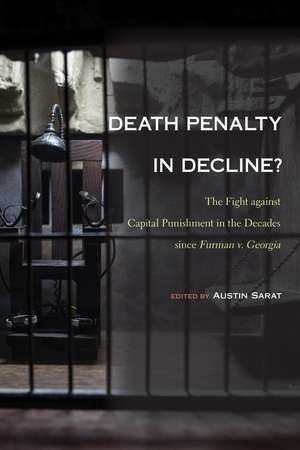Death Penalty in Decline?: The Fight against Capital Punishment in the Decades since Furman v. Georgia
Editat de Austin Saraten Paperback – 31 mai 2024
At a time when the United States is undertaking an unprecedented national reconsideration of the death penalty, Death Penalty in Decline? seeks to evaluate how abolitionists might succeed today.
Contributors: John Bessler, Corinna Barrett Lain, James R. Martel, Linda Ross Meyer, Carol S. Steiker, Jordan M. Steiker, and the editor
| Toate formatele și edițiile | Preț | Express |
|---|---|---|
| Paperback (1) | 220.74 lei 6-8 săpt. | +24.32 lei 6-12 zile |
| Temple University Press – 31 mai 2024 | 220.74 lei 6-8 săpt. | +24.32 lei 6-12 zile |
| Hardback (1) | 593.23 lei 6-8 săpt. | |
| Temple University Press – 31 mai 2024 | 593.23 lei 6-8 săpt. |
Preț: 220.74 lei
Nou
Puncte Express: 331
Preț estimativ în valută:
42.24€ • 45.17$ • 35.22£
42.24€ • 45.17$ • 35.22£
Carte tipărită la comandă
Livrare economică 17 aprilie-01 mai
Livrare express 12-18 martie pentru 34.31 lei
Preluare comenzi: 021 569.72.76
Specificații
ISBN-13: 9781439924822
ISBN-10: 1439924821
Pagini: 254
Dimensiuni: 152 x 229 x 18 mm
Greutate: 0.34 kg
Editura: Temple University Press
Colecția Temple University Press
ISBN-10: 1439924821
Pagini: 254
Dimensiuni: 152 x 229 x 18 mm
Greutate: 0.34 kg
Editura: Temple University Press
Colecția Temple University Press
Recenzii
“This book’s stellar compilation of scholars takes a critical and reflective look at the shape of the death penalty’s evolution since the landmark decision in Furman v. Georgia, which nearly achieved abolition. Building from this foundation, these experts turn a discerning eye toward what may be in store for this country’s most severe penalty and if abolition may be part of that future. Whether you are for or against capital punishment, Death Penalty in Decline? is a markedly insightful and timely exploration.”—Deborah W. Denno, Arthur A. McGivney Professor of Law and Founding Director of the Neuroscience and Law Center at Fordham University School of Law
“The death penalty is in decline, and no wonder—it takes too long, costs too much, discriminates against poor people of color, and risks killing innocent people. It remains a severe, degrading, and barbaric punishment that has been largely abandoned by the democratic countries of the world and most places in the United States. And some of the executions that are carried out are botched. This book provides a valuable examination of the past and future of this profound and irreversible penalty.”—Stephen Bright, Lecturer at Yale and Georgetown law schools, and coauthor of The Fear of Too Much Justice: Race, Poverty, and the Persistence of Inequality in the Criminal Courts
"Sarat assembles a compelling collection of scholarly essays to consider the meandering legacy of Furman v. Georgia (1972).... The scholars here consider the irony that in the short term the anti-death penalty Furman decision reinvigorated the death penalty issue, inspiring more public support and action in dozens of state legislatures. In the long term, however, the guided discretion Furman set loose proved unable to produce a reliably fair process, costing the death penalty support in two places where it clearly matters: state legislatures and jury boxes.... Summing Up: Recommended."—Choice
"Death Penalty in Decline? brings back into focus the significance and complexity of the ruling in a timely manner, more than 50 years after Furman.... The structure of this book helps gradually immerse readers in the interpretation of the Furman ruling and progressively reveals the complexity of its impact.... Taken together, this book theoretically answers, or tries to answer a series of important questions, like what is missing in Furman, how that shapes the current status of the death penalty, and what is going to happen in the future."—Criminal Law and Criminal Justice Books
“The death penalty is in decline, and no wonder—it takes too long, costs too much, discriminates against poor people of color, and risks killing innocent people. It remains a severe, degrading, and barbaric punishment that has been largely abandoned by the democratic countries of the world and most places in the United States. And some of the executions that are carried out are botched. This book provides a valuable examination of the past and future of this profound and irreversible penalty.”—Stephen Bright, Lecturer at Yale and Georgetown law schools, and coauthor of The Fear of Too Much Justice: Race, Poverty, and the Persistence of Inequality in the Criminal Courts
"Sarat assembles a compelling collection of scholarly essays to consider the meandering legacy of Furman v. Georgia (1972).... The scholars here consider the irony that in the short term the anti-death penalty Furman decision reinvigorated the death penalty issue, inspiring more public support and action in dozens of state legislatures. In the long term, however, the guided discretion Furman set loose proved unable to produce a reliably fair process, costing the death penalty support in two places where it clearly matters: state legislatures and jury boxes.... Summing Up: Recommended."—Choice
"Death Penalty in Decline? brings back into focus the significance and complexity of the ruling in a timely manner, more than 50 years after Furman.... The structure of this book helps gradually immerse readers in the interpretation of the Furman ruling and progressively reveals the complexity of its impact.... Taken together, this book theoretically answers, or tries to answer a series of important questions, like what is missing in Furman, how that shapes the current status of the death penalty, and what is going to happen in the future."—Criminal Law and Criminal Justice Books
Notă biografică
Austin Sarat is the William Nelson Cromwell Professor of Jurisprudence and Political Science at Amherst College. He is the author or editor of several books including Lethal Injection and the False Promise of Humane Execution; The Death Penalty on the Ballot: American Democracy and the Fate of Capital Punishment; Gruesome Spectacles: Botched Executions and America’s Death Penalty; and Mercy on Trial: What It Means to Stop an Execution.
